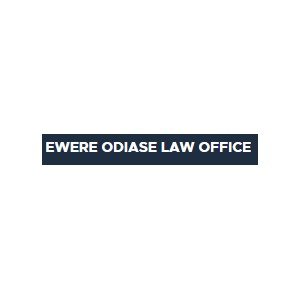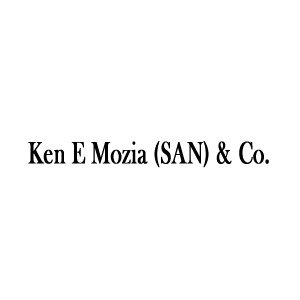Best International Trade Law Lawyers in Asaba
Share your needs with us, get contacted by law firms.
Free. Takes 2 min.
List of the best lawyers in Asaba, Nigeria
About International Trade Law in Asaba, Nigeria
International Trade Law in Asaba, Nigeria, is a complex and evolving field that involves the regulation of trade between countries and governs the exchange of goods, services, and technology across international borders. In Asaba, located in Delta State, Nigeria, trade activities are a key part of economic development, and understanding the legal framework governing these activities is crucial for businesses and individuals engaged in international trade. This field of law encompasses various aspects, including import and export regulations, trade agreements, customs laws, and dispute resolution mechanisms.
Why You May Need a Lawyer
Engaging in international trade can be fraught with legal complexities and potential pitfalls. Here are some common situations where you may require legal assistance:
- Understanding and complying with import/export regulations and tariffs.
- Drafting and reviewing international sales contracts and trade agreements.
- Resolving disputes over contract breaches or trade practices.
- Ensuring compliance with international trade sanctions and embargoes.
- Navigating customs regulations and clearance procedures.
- Handling intellectual property issues related to traded goods or services.
- Facilitating trade financing and payment disputes.
- Working on mergers and acquisitions involving foreign entities.
- Advising on tax implications of cross-border transactions.
- Representation in trade-related litigation and arbitration.
Local Laws Overview
International Trade Law in Asaba is influenced by both Nigerian national regulations and international agreements. Key aspects of local laws relevant to international trade include:
- Customs Duties and Import Regulations: Governed by the Nigeria Customs Service, these laws dictate how goods are imported, duties are assessed, and compliance is ensured.
- Foreign Exchange Control: The Central Bank of Nigeria regulates foreign exchange transactions crucial for international trade.
- Trade Agreements: Nigeria is a party to various bilateral and multilateral trade agreements which may affect local businesses engaged in international trade.
- Dispute Resolution: Legal frameworks exist for resolving trade disputes, including litigation in national courts and arbitration through international bodies.
- Export Incentives and Regulations: Policies are in place to promote exports through incentives and support mechanisms.
- Compliance with International Standards: Businesses must ensure adherence to international standards and regulations within their industry.
Frequently Asked Questions
What documents are necessary for exporting goods from Nigeria?
Typically, you need a variety of documents including a commercial invoice, packing list, certificate of origin, bill of lading, and any licenses required for specific goods.
How are disputes resolved in international trade matters?
Disputes can be resolved through litigation in Nigerian courts, arbitration, or mediation, often depending on the terms of the trade contract.
What are the recent developments in Nigeria's trade policies?
Recent developments focus on diversifying Nigeria's export base, enhancing trade facilitation measures, and reinforcing compliance with international standards.
How do I ensure compliance with Nigerian customs regulations?
Engage with the Nigeria Customs Service, ensure accurate documentation, and stay updated with the latest tariffs and regulatory changes.
Which agencies regulate international trade in Asaba?
The Nigeria Customs Service, Central Bank of Nigeria, National Agency for Food and Drug Administration and Control (NAFDAC), and the Standards Organization of Nigeria (SON) are key regulatory bodies.
Are there any incentives for exporting goods from Nigeria?
Yes, there are export incentives such as duty drawbacks, export expansion grants, and tax exemptions available to Nigerian exporters.
What impact do international trade agreements have on my business?
Trade agreements can offer reduced tariffs and easier market access, but they may also bring about stricter compliance requirements.
Can foreign nationals own businesses involved in trade in Nigeria?
Yes, foreign nationals can own businesses, but they must comply with local regulations on business registration and foreign investment.
How does foreign exchange regulation affect international trade?
Foreign exchange regulations impact how trade transactions are financed and can affect the cost and flow of trade due to currency control measures.
What should I consider when drafting an international sales contract?
Consider including clear terms on payment, delivery, compliance with laws, dispute resolution mechanisms, and liability limitations.
Additional Resources
For further assistance, consider the following resources:
- Nigeria Customs Service: Offers guidelines and directives related to imports and exports.
- Central Bank of Nigeria: Provides information on foreign exchange policies and trade financing.
- Export Promotion Councils: Assist businesses in exploring international markets and securing export licenses.
- Trade Associations: Industry-specific associations can offer insights and advocacy services.
- Legal Firms Specializing in Trade Law: Engaging with expert legal firms in Asaba can provide tailored advice.
Next Steps
If you need legal assistance in International Trade Law in Asaba, consider the following steps:
- Identify reputable law firms in Asaba that specialize in international trade law.
- Schedule consultations to discuss your specific trade-related issues.
- Gather all relevant documentation and details pertinent to your case or business needs.
- Ensure that any legal agreement or service engagement is clear and meets your requirements.
- Stay informed about changes in trade regulations and industry practices by subscribing to relevant publications and resources.
Lawzana helps you find the best lawyers and law firms in Asaba through a curated and pre-screened list of qualified legal professionals. Our platform offers rankings and detailed profiles of attorneys and law firms, allowing you to compare based on practice areas, including International Trade Law, experience, and client feedback.
Each profile includes a description of the firm's areas of practice, client reviews, team members and partners, year of establishment, spoken languages, office locations, contact information, social media presence, and any published articles or resources. Most firms on our platform speak English and are experienced in both local and international legal matters.
Get a quote from top-rated law firms in Asaba, Nigeria — quickly, securely, and without unnecessary hassle.
Disclaimer:
The information provided on this page is for general informational purposes only and does not constitute legal advice. While we strive to ensure the accuracy and relevance of the content, legal information may change over time, and interpretations of the law can vary. You should always consult with a qualified legal professional for advice specific to your situation.
We disclaim all liability for actions taken or not taken based on the content of this page. If you believe any information is incorrect or outdated, please contact us, and we will review and update it where appropriate.













